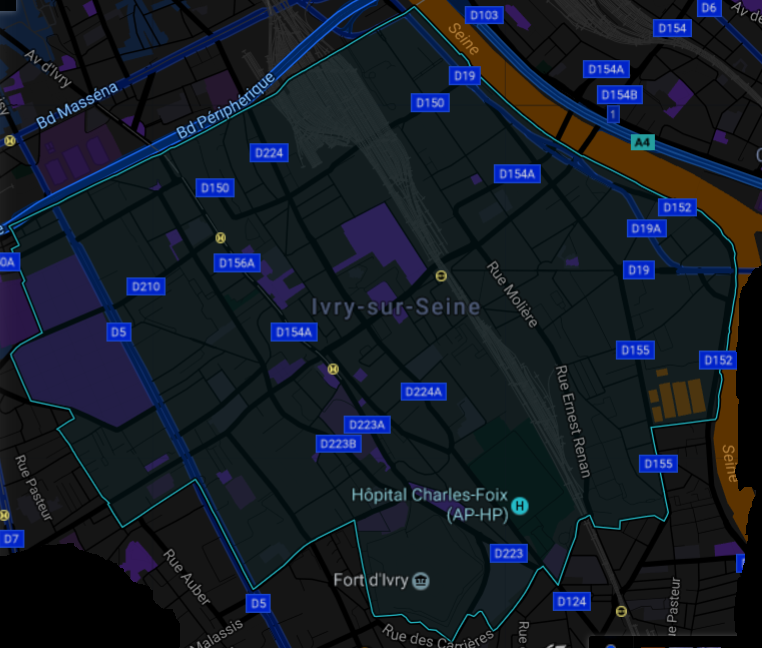Ivry-sur-Seine: Difference between revisions
(Created page with ";Paris Ivry-sur-Seine is a commune in the Val-de-Marne department in the southeastern suburbs of Paris, France. It is located 5.3 km (3.3 mi) from the center of Paris. P...") |
|||
| (2 intermediate revisions by the same user not shown) | |||
| Line 1: | Line 1: | ||
;[[Paris]] | ;[[Paris]] | ||
----------------- | |||
;[[File:Ivry-sur-Seine.png]] | |||
--------------- | |||
Ivry-sur-Seine is a commune in the Val-de-Marne department in the southeastern suburbs of Paris, France. It is located 5.3 km (3.3 mi) from the center of Paris. | Ivry-sur-Seine is a commune in the Val-de-Marne department in the southeastern suburbs of Paris, France. It is located 5.3 km (3.3 mi) from the center of Paris. | ||
Paris's main Asian district, the Quartier Asiatique in the 13th arrondissement, borders the commune and now extends into the northern parts of Ivry. Asian commercial activity, especially Chinese and Vietnamese, has greatly increased in Ivry-sur-Seine during the past two decades. The commune contains one of the highest concentrations of Vietnamese in France, who began settling in the city in the late 1970s after the Vietnam War. | Paris's main Asian district, the Quartier Asiatique in the 13th arrondissement, borders the commune and now extends into the northern parts of Ivry. Asian commercial activity, especially Chinese and Vietnamese, has greatly increased in Ivry-sur-Seine during the past two decades. The commune contains one of the highest concentrations of Vietnamese in France, who began settling in the city in the late 1970s after the Vietnam War. | ||
Politically, Ivry-sur-Seine has historically demonstrated strong electoral support for the French Communist Party (PCF). Between 1925 and 2015 (except for the period of German occupation in World War II) the office of mayor was held by just three individuals: | ==History== | ||
Politically, Ivry-sur-Seine has historically demonstrated strong electoral support for the French Communist Party (PCF). Between 1925 and 2015 (except for the period of German occupation in World War II) the office of mayor was held by just three individuals. | |||
Originally, Ivry-sur-Seine was called simply Ivry. The name Ivry comes from Medieval Latin Ivriacum or Ibriacum, perhaps meaning "estate of Eburius (the Latinized form of the Gallic patronym Eburos)", a Gallo-Roman landowner. | |||
In 1897, the name of the commune officially became Ivry-sur-Seine (meaning "Ivry upon Seine"), in order to distinguish it from other communes of France also called Ivry. | |||
On 1 January 1860, the city of Paris was enlarged by annexing neighbouring communes. On that occasion, about a third of the commune of Ivry-sur-Seine was annexed to Paris, and now forms the Chinatown area of the 13th arrondissement of Paris. | |||
Ivry-sur-Seine is perhaps most famous as the place of execution of Jean-Marie Bastien-Thiry in March 1963. Richard Ellman also notes that James Joyce's daughter, Lucia, received psychiatric treatment in the commune's hospital in 1936 and was visited by both Joyce and Samuel Beckett. | |||
==Economy== | |||
Fnac has its head office in the commune. The head office moved there in 2008. E.Leclerc's head office is in the commune. | |||
==Transport== | |||
Ivry-sur-Seine is served by two railway stations on the Paris Métro Line 7: Pierre et Marie Curie and Mairie d'Ivry. | |||
The east of the commune is served by Ivry-sur-Seine station on Paris RER line C with stops at the Bibliothèque Nationale de France and the city centre. | |||
Orly Airport is located to the south of Ivry-sur-Seine. | |||
Latest revision as of 16:46, 25 December 2016
Ivry-sur-Seine is a commune in the Val-de-Marne department in the southeastern suburbs of Paris, France. It is located 5.3 km (3.3 mi) from the center of Paris.
Paris's main Asian district, the Quartier Asiatique in the 13th arrondissement, borders the commune and now extends into the northern parts of Ivry. Asian commercial activity, especially Chinese and Vietnamese, has greatly increased in Ivry-sur-Seine during the past two decades. The commune contains one of the highest concentrations of Vietnamese in France, who began settling in the city in the late 1970s after the Vietnam War.
History
Politically, Ivry-sur-Seine has historically demonstrated strong electoral support for the French Communist Party (PCF). Between 1925 and 2015 (except for the period of German occupation in World War II) the office of mayor was held by just three individuals.
Originally, Ivry-sur-Seine was called simply Ivry. The name Ivry comes from Medieval Latin Ivriacum or Ibriacum, perhaps meaning "estate of Eburius (the Latinized form of the Gallic patronym Eburos)", a Gallo-Roman landowner.
In 1897, the name of the commune officially became Ivry-sur-Seine (meaning "Ivry upon Seine"), in order to distinguish it from other communes of France also called Ivry.
On 1 January 1860, the city of Paris was enlarged by annexing neighbouring communes. On that occasion, about a third of the commune of Ivry-sur-Seine was annexed to Paris, and now forms the Chinatown area of the 13th arrondissement of Paris.
Ivry-sur-Seine is perhaps most famous as the place of execution of Jean-Marie Bastien-Thiry in March 1963. Richard Ellman also notes that James Joyce's daughter, Lucia, received psychiatric treatment in the commune's hospital in 1936 and was visited by both Joyce and Samuel Beckett.
Economy
Fnac has its head office in the commune. The head office moved there in 2008. E.Leclerc's head office is in the commune.
Transport
Ivry-sur-Seine is served by two railway stations on the Paris Métro Line 7: Pierre et Marie Curie and Mairie d'Ivry.
The east of the commune is served by Ivry-sur-Seine station on Paris RER line C with stops at the Bibliothèque Nationale de France and the city centre.
Orly Airport is located to the south of Ivry-sur-Seine.
